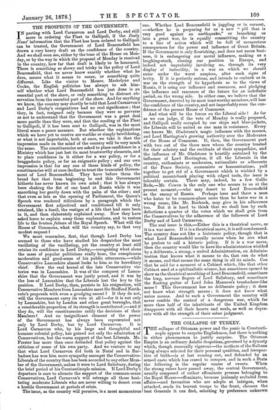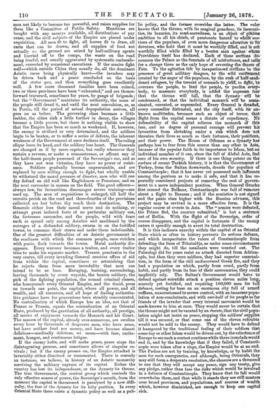THE COLLAPSE OF TURKEY.
men not likely to become too powerful, and raises supplies for them like a Committee of Public Safety. Munitions are bought with any moneys available, all distributions of pay, cease, and the civil subjects of the Empire are placed under requisition. All men fit to fight, all horses fit to draw, all carts that can be drawn, and all supplies of food not, actually on the ground are seized by half-military agents and hurried off to the camps, the waste on the road being fearful, and usually aggravated by systematic embezele- ment, corrected by occasional executions. If the armies fight well—which outside China they usually do, all the dominant Asiatic races being physically brave—the invaders may be driven back and a peace concluded on the basis of the status quo, and then everything goes excellently well. A few score thousand families have been ruined, two or three provinces have been " exhausted," and are thence- forward traversed, sometimes for years, by gangs of brigands ;• but the "Government" maintains its authority, the mass of the people still dread it, and until the next convulsion, or, as in Persia, till the period of actual depopulation arrives, all goes on as before. The governing class becomes a little feebler, the cities sink a little further in decay, the villages become a little poorer, but there is nothing visible to show that the Empire has been so much as weakened. If, however, the enemy is civilised or very determined, and the soldiers begin to be beaten, or to suffer a series of defeats, the inherent weakness of the Government at once declares itself. The ruling clique loses its head, and the soldiery lose heart. The Generals are changed as if by mere caprice, but really whenever they sustain a reverse, or make a remonstrance, or affront any of. the half-dozen people possessed of the Sovereign's ear, and as they have not won victories, they have no power of resist- ance. Soldiers gradually become unprocurable, and are replaced by men willing enough to fight; but wholly unable to withstand the moral pressure of disaster, men who will one day defend an old wall like Englishmen or Prussians, and on the next surrender in masses on the field. The good officers— always few, for favouritism discourages severe training—are used up. The area of requisitions is enlarged, till half thern recruits perish on the road and three-fourths of the provisions collected are lost before thy reach their destination. The Generals either lose their moral nerve and do nothing, or attempt great isolated feats of no particular military use, the fortresses surrender, and the people, wild with fears such as spread only among Asiatics and maddened by the outrages of a disbanded soldiery, swarm in on the fortified towns, to consume their stores and make them indefensible. One of the greatest difficulties of an Asiatic government is the readiness with which the common people, once stricken with panic, flock towards the towns. Moral authority dis- appears. Every waverer becomes a traitor, and every traitor tries to make his separate market. Treason penetrates to the very centre, till every invading General receives offers of aid from within the capital, sometimes so astonishing that he rejects them from mere incredulity that men can intend to be so base. Ravaging, burning, surrendering, leaving thousands by every wayside, the beaten soldiery, the pick of the fighting population, the nomad criminal classes, who honeycomb every Oriental Empire, and the timid, press on towards one point, the capital, where all power, and all wealth, and all resources, and all hope of finding authorita- tive guidance have for generations been steadily concentrated. No centralisation of which Europe has an idea, not that of France or Prussia, equals the centralisation of an Oriental State, produced by the gravitation of all authority, all prestige, all means of enjoyment towards the Monarch and his Court. The masses of the capital, already over-numerous, are swollen every hour by thousands of desperate men, who have arms, but have neither food nor money, and have become almost delirious—medically delirious, we mean—with fear, excite- ment, hunger, and continuous fatigue.
If the enemy halts, and will make peace, peace stops the disintegrating process, and sometimes allows of singular re- vivals; but if the enemy presses on, the Empire attacked is invariably either dissolved or transmuted. There is scarcely an instance, we believe, in history of an Asiatic monarchy surviving the military capture of its capital. Either the country has lost its independence, or the dynasty its throne. The true Government, the central group which controls the only effective source of power, the Sovereign's mouth, from the moment the capital is threatened is paralysed by a new diffi- culty, the fear of the dynasty for its lofty position. In every Oriental State there exists a dynastic policy as well as a pub- lie policy, and the former. overrides the -latter. The ruler knows that the throne, with its magical grandeur, its immuni- ties, its luxtries, its semi-taeredness, is an dbreA anabition to at his chiefs, of patsionate hatted to whiVesec4 tions of the peptilate, of eVeli indre datgerout adOtatittif tbIte deantees, who held that it natat be ittithilY"filled, and le not werthily filled while filled by a beaten than ageing' valktit Previdente itself has 'deolared. Ea& of these etectleant de::* pounces the Palace as the fetritait of all Miafortunee, and fot a change there as the only hope of retetning the --d'eerelY dt rate. To the agitation felt by inexperiended' Cirillana 'the presence of great military dangers, to the Wild • 'eaeetteinent. created by the anger of the poptdace, by the rnall of half-ntaai. dimed refugees, by the terrent of -cotnisela tb yield', to fletit; tot(' overawe the people, to lead the. people, %el pardet WAY= body, to massaare everybody, is added th* auptettea fear' that the throne will fall, that the dynast'-',41 be' condemned, or that the indiVidhal menateh will be aaakaa • Blinded, exeetted, or superseded. Every Oeneral is &Wed, every scounsellin diStimated, and the city itself, with it inv. known multithdek, becomes such at object of terror, that' flight from the Capital seems a dictate of expedieney. defensibility Of' the capital relieves the Monateh of" thle feat, and no degree of personal cottage will prevent fairotrites from. shrinking tinder a risk which. dtete -Pot threaten their lives so much as their fOrtlines, 'their poein, and their power. The House of Cahalan as a perhaps less less to fear from this source than any other in Age, because of the popular faith in its importance to lelankblit individual member of' it can, since the fall' of' Abtltd Azit, feel sure of his own eectrity. If there is one thing patent on the surface of recent Tarkish history, it is that the Government of Terkey, frem.the &hat downwards, dreads the' populace of Constantinople; that it has never yet pOeSeased suth initiarite among the garrison as to make it safe, and that it has' rè;.
peatedly considered project's of removing the seat' of Overti4 merit to a more independent position. When General' GbittliO flint 'crossed the Balkans, Constantinople was full-Of teniontSf abet& a flight to Brous; and if the arniistioe is net eighed and the panic rises higher with the Ruffen= adirenee;, thilt project may be revived in a more effective fable. !Oath& regular course of events in Asia. The "armies Were'ddeated, the Prince' fled, the country submitted," is but a sentalide out of Rollin. With the flight of the Sovereign, order of course 'disappears, and the capital is fortunate if the 'efieiny enters it speedily enough to avert its total death:Edith: It is this 'inchoate anarchy Within the Capital Of an Oriental State which so often in history prevents its serious. defence, and which incapacitates the rulers of Constantineple fro`m defending the lines of Tchataldja, as under some cireulastanees they might do, till the assailants were wearied out: The Paheologi did for years resist an attack directed flat Adrian- ople, but then they weresoldiers, they had superior attrennt.i riot, in the form of the still undiscovered Greek fire, and they' had a population on which, partly from creed, partly ?rent habit, andpartly from its fear 'of their mercenaries; they could' implicitly rely. The Sultan's Government would have tee defend against 'scientific attack a position eleven Milted' long, .
scarcely yet fortified, and requiring 100000' Men ter 'full defence, resting for base on an enormous 'city' full of arteeff ruffians, unacenstomedtosevere control, with an immente pepta lation of hot-combatants, and with one-half of its people so' fat friends of the invader that every internal' moverteht tordd be made known to him at once. They Would never be certain that the throne might not be vacated by an imeate,that theolirirpopit- laden might not insist on peace, stopping the soldiere stippliet till it was secured, or that some one of the eleven retionhte would not be sold to the enemy. They would haVe to defend' it hampered by the traditional feeling of their soldiers that some day or other Islam would bedriveh ont,lay the relitetanceof' Europe to see such a contest continue while three ironelads Would end it, and by the knowledge that if they failed, if tbaratantl;. nople were taken after a siege, the Empire would -be at an-end. The Pashas are not by training, by knowledge, or by habit 'the men for such emergencies, and although, being Orientalif, they may still form a desperate resolution, the chancee-are a thottaand to one that they will accept any peace, sign any treaty, giVe• say pledge, rather than face the riske which werild' be niVolVed in a defence of Constantinople. They know that its fall 'would overwhelm them, and that while it stands they are still masters over broad provinces, and populationsi and' gotten -cif wealth Which, however diminished, are enough to keep one capital rich.



































 Previous page
Previous page